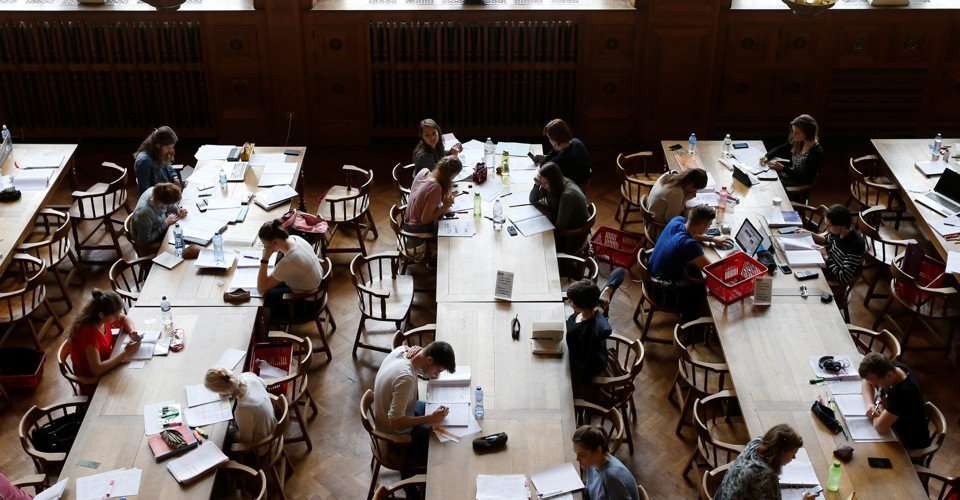Read: Why do so many graduate students quit?
To make matters worse, the payoff for all that stress may be wanting: A 2014 report found that nearly 40 percent of the doctoral students surveyed hadn’t secured a job at the time of graduation. What’s more, roughly 13 percent of Ph.D. recipients graduate with more than $70,000 in education-related debt, though in the humanities the percentage is about twice that. And for those who do secure an academic post, census data suggest that close to a third of part-time university faculty—many of whom are graduate students—live near or below the poverty line.
A new study by a team of Harvard-affiliated researchers highlights one of the consequences of these realities: Graduate students are disproportionately likely to struggle with mental-health issues. The researchers surveyed roughly 500 economics Ph.D. candidates at eight elite universities, and found that 18 percent of them experienced moderate or severe symptoms of depression and anxiety. That’s more than three times the national average, according to the study. Roughly one in 10 students in the Harvard survey also reported having suicidal thoughts on at least several days within the prior two weeks. (Other recent studies have had similar findings, including one published earlier this year that described graduate-student mental health as a “crisis.”)
The study’s results, which also include survey responses from nearly 200 faculty members, indicate that many Ph.D. students’ mental-health troubles are exacerbated, if not caused, by their graduate-education experiences. Roughly half of the respondents in the Harvard study with anxiety and/or depression had been diagnosed sometime after starting their graduate studies. And students toward the end of their programs were far more likely than those who were just embarking on their graduate journeys to report severe symptoms of anxiety or depression.
Graduate students cite the combination of financial and professional pressures as a significant challenge. Lucy Johnson, an assistant professor of digital literacies at the University of Wisconsin–Eau Claire, says that the financial burdens of her Ph.D. studies made it difficult for her to “escape the graduate curriculum”—by, say, seeing a movie or going out for dinner. Students who already feel isolated by their rigorous academic work are bound to feel even more isolated by their financial troubles, she suggests. Like many of her peers, Johnson eventually took out loans to support herself.
And then there is the academic pressure itself. Graduate education relies on “this idea that we have to produce, produce, produce, or do a lot more labor than others, so we’re worn quite thin,” says Johnson, noting that such labor is often promoted under the guise of “professionalization.” “I think it’s something we’re just supposed to accept as being part of the process.”

Marsdreamer on November 29th, 2018 at 04:28 UTC »
Who'da thought working 60+ hours a week with no benefits, completely at the whim of a work-aholic boss, for what amounts to about $6 an hour for 4 - 6 years would be mentally damaging to people?
Redrot on November 29th, 2018 at 04:27 UTC »
The perfect thing to read right as my grad app deadlines are coming up!
maxwellhill on November 29th, 2018 at 02:43 UTC »
https://scholar.harvard.edu/bolotnyy/publications/graduate-student-mental-health-lessons-american-economics-departments
https://scholar.harvard.edu/files/bolotnyy/files/bbb_mentalhealth_paper.pdf
https://scholar.harvard.edu/files/bolotnyy/files/bbb_mentalhealth_executive_summary.pdf
Abstract:
We study the mental health of graduate students at Economics PhD programs in the U.S. Using clinically validated surveys, we find that 18% of graduate students experience moderate or severe symptoms of depression and anxiety — more than three times the population average — and 11% report suicidal ideation in a two-week period. The average PhD student reports greater feelings of loneliness than does the average retired American. Only 26% of Economics students report feeling that their work is useful always or most of the time, compared with 70% of Economics faculty and 63% of the working age population. Depression and symptoms of anxiety increase with time in the program: 25% of students in years 5+ of their programs experience moderate or severe symptoms of depression or anxiety compared with 14.5% of first-year students. Many students with significant symptoms of mental distress are not in treatment. We provide recommendations for students and faculty on ways to improve student work conditions, productivity, and mental health.